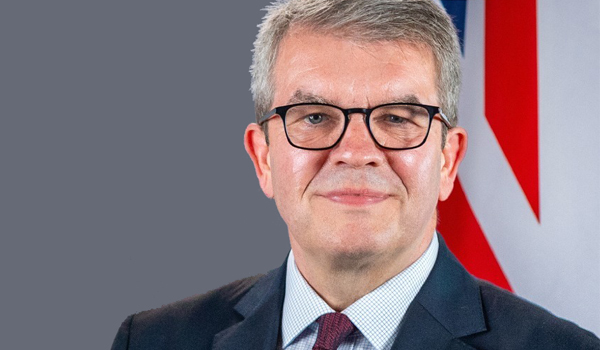Former NPCC chair to head up new Border Security Command
The former chair of the National Police Chiefs’ Council (NPCC) has been appointed to lead the UK’s new Border Security Command.
The Prime Minister said Martin Hewitt’s “unique expertise” will lead a new international effort to tackle criminal smuggling networks.
The new Border Security Command has been hailed as a “significant step forward” in the fight against illegal migration and criminal smuggling gangs.
It will be armed with enhanced powers and will coordinate the work of all law enforcement and intelligence agencies to lead joint investigations with European counterparts to address organised immigration crime.
Mr Hewitt has more than 30 years’ experience tackling serious crime and protecting national security.
As former chair of the NPCC he led strategic coordination across all UK police forces and played a critical role in shaping national responses to major security threats, including terrorism, organised crime and illegal migration.
The Prime Minister said his ability to bring together policing, law enforcement, intelligence agencies and government bodies in response to major security threats was key to his appointment. His leadership was most visibly demonstrated in managing the UK’s response to the Covid-19 pandemic, coordinating policing efforts.
Sir Keir Starmer said: “No more gimmicks. This government will tackle the smuggling gangs who trade the lives of men, women and children across borders.
“Martin Hewitt’s unique expertise will lead a new era of international enforcement to dismantle these networks, protect our shores and bring order to the asylum system.”
Mr Hewitt said: “I am honoured and excited to lead this new and groundbreaking Command. I am under no illusions of the challenges that lie ahead, but I am determined to face them head-on.
“For too long, the criminal gangs who smuggle people through Europe have abused our borders in the name of profit, and they are responsible for the deaths of scores of vulnerable, innocent people. We will dismantle them, bring them to justice and prevent them from using exploitation and deceit to fill their pockets.
“It is great to see that progress has been made in recent weeks, and we will build on this to forge deeper relationships with all of the organisations within Border Security Command, as well as our friends and partners across the world.”
Home Secretary Yvette Cooper said she was “delighted” to welcome Mr Hewitt to the role.
“Following decades working at the top of law enforcement on national security, public safety and serious organised crime he has the experience and track record we need to lead our Border Security Command,” she said.
“Dangerous criminal smuggling gangs have been making millions out of small boat crossings, undermining our border security and putting lives at risk, and getting away with it for far too long.
“Under this Government we have taken early action against the smuggler gangs including increasing British officers stationed at Europol and commencing recruitment of 100 specialist investigators to go after these criminal networks and their supply chains, including seizing boats and engines.
“With the Border Security Command we can go much further – building new law enforcement partnerships across Europe and getting new powers into place, to go after the gangs, tackle dangerous boat crossings and save lives.”
The appointment comes as part of the Prime Minister’s visit to Italy, where he will discuss with Prime Minister Giorgia Meloni her country’s success in tackling irregular migration. Italy has seen a 60 per cent drop in irregular migration by sea over the past year thanks to tough enforcement and international cooperation.
The Prime Minister will be joined in Rome by Mr Hewitt and will outline the UK’s strategy to work more closely with European partners to pursue, disrupt and arrest those responsible for this vile trade.
During the visit they will tour the National Coordination Centre for Migration to see first-hand how Italy responds to irregular migration and discuss future cooperation.
This month the National Crime Agency (NCA) hosted a summit of Cabinet ministers and law enforcement partners that discussed plans for further collaboration with European partners.
This renewed cooperation has already led to success, including cooperation with Bulgaria seeing more than 40 small boats and engines being intercepted in recent weeks – enough to have enabled 2,400 people to attempt the crossing. This work is among 70 live operations the NCA is currently running with international partners.


